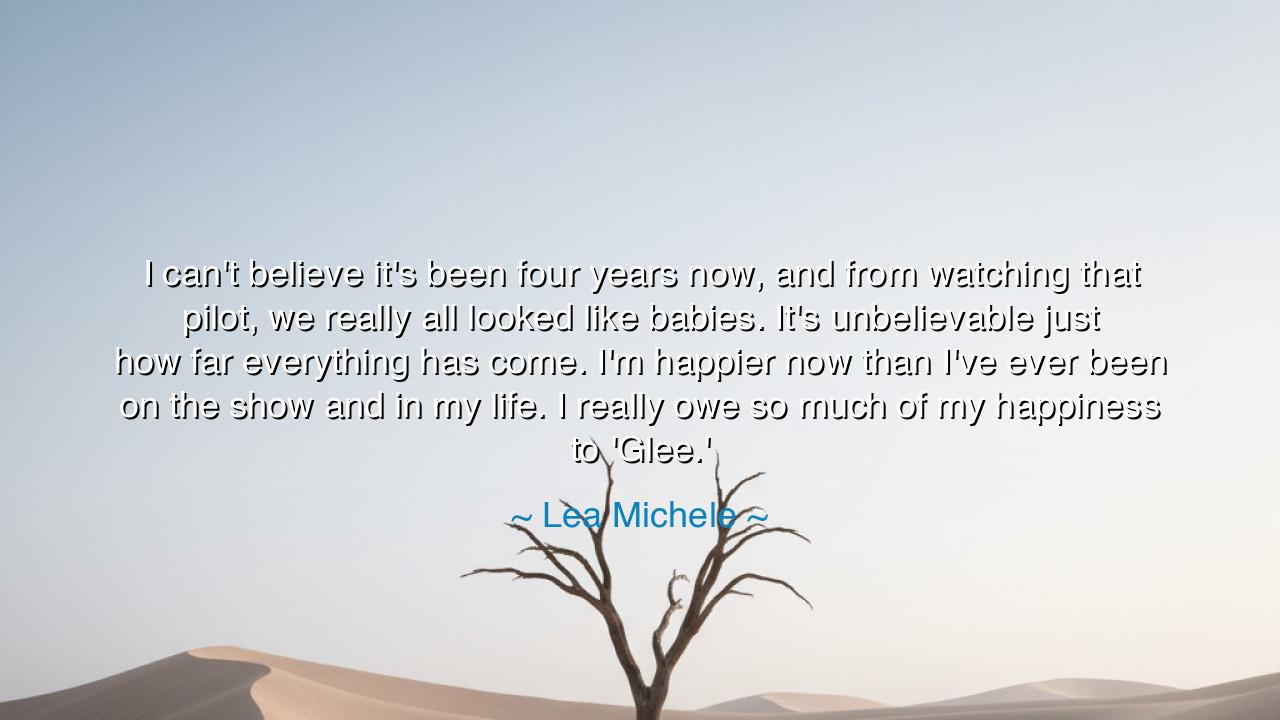
I can't believe it's been four years now, and from watching that
I can't believe it's been four years now, and from watching that pilot, we really all looked like babies. It's unbelievable just how far everything has come. I'm happier now than I've ever been on the show and in my life. I really owe so much of my happiness to 'Glee.'






When Lea Michele said, “I can’t believe it’s been four years now, and from watching that pilot, we really all looked like babies. It’s unbelievable just how far everything has come. I’m happier now than I’ve ever been on the show and in my life. I really owe so much of my happiness to ‘Glee,’” she was not merely reminiscing about a television series. In these words lies something far deeper—the eternal truth of growth, gratitude, and transformation through purpose. She speaks as one who has journeyed from innocence to maturity, who has seen the passing of years not as loss, but as the unfolding of destiny. Her joy is not born of fame, but of becoming—of looking back upon the tender beginnings of youth and marveling at how life, through time and trial, shapes us into who we are meant to be.
To “look like babies” is her poetic way of acknowledging the distance between who they were and who they have become. In the beginning, the cast of Glee were young dreamers stepping into the unknown, uncertain of their future, yet full of fire and hope. Now, years later, she stands as both witness and participant in that journey—a testament to the truth that growth is slow, but certain. In her reflection, there is wonder at how time refines the spirit, how effort ripens talent, and how shared struggle builds unbreakable bonds. This is not merely nostalgia; it is reverence for the sacred passage of becoming, for the silent work of years that molds youth into purpose.
Her words also speak of gratitude, the rarest and most radiant of virtues. “I owe so much of my happiness to ‘Glee,’” she declares—not to fortune, not to fame, but to the craft, the people, and the experiences that shaped her. In this gratitude, we see the humility of one who knows that joy is not self-made. True happiness, she teaches, comes from connection—the way shared purpose with others deepens the soul and multiplies meaning. The show was not simply a stage; it was a family, a forge, a mirror of human hope. From it, she learned that happiness is not found in achievement alone, but in belonging—in the bonds formed along the journey toward one’s dreams.
The ancients, too, knew this truth. The philosopher Aristotle taught that happiness—eudaimonia, the flourishing of the soul—comes not from fleeting pleasure, but from a life of purpose and virtue. Just as the young actors of Glee grew through their shared craft, so too did the disciples of old grow through their shared pursuit of wisdom. It is through dedication, not luck, that the heart finds peace. Lea Michele’s journey mirrors this: the transformation from youthful uncertainty to mature joy, from the spark of ambition to the steady light of fulfillment. Like the apprentice who one day becomes the master, she stands as proof that persistence in one’s calling brings not only success, but serenity.
Consider the story of Helen Keller, who began her life in darkness and silence. Through her teacher, Anne Sullivan, she found not just words, but the boundless joy of learning and connection. In her later years, Keller said she owed her happiness to her education and to the people who helped her see the world anew. In her, as in Michele, we find the same revelation: that happiness is born of gratitude—the recognition that every joy is a gift woven through the hands of others. Just as Keller’s teacher awakened her spirit, Glee awakened Michele’s—giving her the stage upon which she discovered not fame, but herself.
Yet beneath her joy, there is also a whisper of wisdom: time passes, and change is inevitable. To look back upon the “pilot” is to look upon one’s own beginning and to realize that the river of life flows swiftly. What once seemed fragile has now grown strong; what once was new has now become legacy. Her reflection teaches us that happiness is not to be found in resisting time, but in embracing it—in honoring the passage, the lessons, and the growth that years bring. To be “happier now than ever” is not to have escaped hardship, but to have made peace with it. In this way, time, once feared, becomes the artist that sculpts our joy.
So, my children of the present age, learn from this: honor your beginnings. Look kindly upon the “babies” you once were, for they dared to begin when the path was unclear. Be grateful for the journey—for every teacher, friend, or challenge that shaped your becoming. And when you find happiness, let it be the happiness of growth, not of comfort—the joy of knowing that each step forward, each year endured, has made you wiser and more whole. For as Lea Michele reminds us, the greatest happiness is not given, but earned through gratitude, time, and transformation. And when you, too, look back upon the early days of your journey, may you smile as she did—thankful for how far you have come, and for the life that has shaped you into all that you were meant to be.






AAdministratorAdministrator
Welcome, honored guests. Please leave a comment, we will respond soon